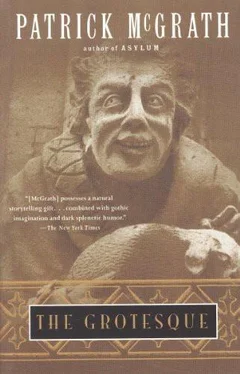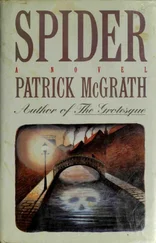Not so extraordinary, you will say; but have you ever seen a pike? They have narrow, pointed snouts, and a projecting lower jaw crammed with sharp teeth, and they seem to grin at you; and this one was very big, and very old. The construction of their heads is an instance of natural functional design, no more than that, but it tends to make one think them malevolent; and when this one appeared with such sinister suddenness from inside the bloated and foul-smelling corpse of the cow, the gaze of its cold killer’s eyes (and pike will eat anything, even their own kind) seemed so charged with malice and evil that my hair, for a moment, quite literally froze on my head. I did not, as I say, take the incident very seriously at the time, beyond, that is, describing it in detail at dinner that night; but often in recent days the picture of that wicked old pike sliding out of the cow’s belly has come into my mind, without any apparent pretext.
Just to finish the story, it occurred to me that the dead cow would make good feed for George’s pigs, so I tramped off across the marsh in a northeasterly direction, to Ceck’s Bottom, and told him about it. And as far as I know it was George’s pigs that got the rest of that cow, not the old pike.
♦
I soon made the acquaintance of Doris Fledge, she of the crowlike features and red-tipped nose. In those early days of autumn she cooked us solid, unpretentious meals that always came hot to the table, and I was well satisfied. Maybe Harriet had been right about the Fledges, I thought. Like Darwin I do not care what I eat as long as it’s the same every day, and I had been used to depend on old Mrs. Dome (when her rheumatism wasn’t “playing up”) to put square, English meals before me, meat and vegetables unadulterated by sauces, spices, or savories. Mrs. Fledge was apparently in the same culinary tradition, and this permitted me to devote my mealtimes to reading the Times , or thinking about my lecture, or tormenting Sidney Giblet, with no anxieties about what would appear on my plate.
One morning, feeling particularly jaunty before going out to the barn, I decided on impulse to visit the kitchen, and inquire of Mrs. Fledge what was for lunch, and say a kind word or two—a kind word from the master never goes amiss, with servants. I had been out in the vegetable garden with George, who was building a bonfire of dead leaves and other garden rubbish, and as I remember it was a fine, crisp day, which was why I was feeling jaunty. Crossing the yard toward the back door, I glimpsed Mrs. Fledge in the kitchen; she had her back to the window, and was occupied with something at the large oak dresser that fills one entire wall of the room. Even from halfway across the yard there was an unmistakably furtive character to the woman’s movements, and I remembered a hunch I’d formed about her the first time I clapped eyes on her. Well, I advanced briskly across the yard, my leather-soled brogues ringing out sharp and clear on the dry stones, and she must have heard me, for she quickly moved away from the dresser, and over to the sink, where I found her washing up the breakfast dishes when I came in through the back door.
“Morning Mrs. Fledge,” I said.
“Good morning, Sir Hugo,” said she, rapidly wiping her hands on the apron lashed tightly about her narrow waist, and looking flustered in a way I rather enjoyed. A strand of silver-threaded hair had escaped her bun, and she pushed it aside with a quick, nervous movement.
“Go on with your work, Mrs. Fledge,” I said, airily, striding about the kitchen. “I merely wanted to know what sweetmeats and dainties you planned to tempt us with at luncheon today.”
I had fetched up hard by the oak dresser; the woman’s fluster increased perceptibly. “Chops, Sir Hugo,” she said.
“Splendid! I love a chop. Grilled?”
“Yes, Sir Hugo.”
In the middle of the kitchen, which is rather a low room with black beams running across the ceiling, and a flagstoned floor, and a huge black wood-burning stove at the far end, there stands a table of scrubbed oak, and upon it lay a thick bunch of carrots, the soil still clinging to them and their leafy tops splayed greenly across the pale wood, and beside them a bowl of large potatoes, a bowl of onions, and a cabbage. All products of the Crook garden, reared with loving care by that good man George Lecky. “And carrots, Mrs. Fledge?” I said.
“Yes, Sir Hugo.” She was standing with her back to the sink, polishing a teacup and positively reeking of guilt. I dug my hands deep in my trouser pockets and approached the woman. As I suspected, it was not only guilt she reeked of—she’d been at my sherry! She must have a bottle stashed in the dresser! I drew close. Terror blazed up in her blackbird eyes. She almost dropped the teacup. From about eighteen inches I gazed into her horror-struck face and examined the delicate lacework of ruptured capillaries on the point of her beak, and smiled. “And onions, Mrs. Fledge?” I said.
“Yes, Sir Hugo.” She had frozen rigid. I pushed aside the strand of silver hair that had again worked loose from the bun. I ran my fingers across her cheek, and squeezed her little earlobe. “Jolly good,” I said, and sauntered out of the kitchen. I would say nothing yet, I decided. I would choose my moment. There would, I felt sure, come a perfect opportunity to bring up with Harriet the housekeeper about whom she had insisted there would not be a “problem.” Your housekeeper, I would say, does have a “problem,” Harriet. She “drinks.”
I paid particularly close attention to the chops that day, curious as to whether Mrs. Fledge’s tippling hampered her performance in the kitchen. They were delicious. They were grilled to perfection. The carrots were thoroughly boiled, and the potatoes flawlessly mashed. Perhaps, I thought, like Churchill she functions best on a steady tipple. I was right, I reflected, to say nothing. I turned to Sidney and asked him what he knew about the life cycle of the botfly. The poor dummy blushed scarlet; he had never even heard of the bot-fly, so I told him all about it. Do you know about the life cycle of the bot-fly? Gastrophilus equi? It lays its eggs on the forequarters of a horse. When the eggs hatch out, the irritation makes the horse lick the hairs and swallow the larvae. The larvae feed on the inner lining of the horse’s stomach for a year, and then lodge in its dung and are excreted. They bury themselves in the ground and pupate—and the process starts all over again. Elegant, no? Elegant, invariable—and pointless.
Of all the various perspectives I am offered by the chance emplacement of my wheelchair, there are two that I particularly favor. The first, a strong contender on warm days, is between the French windows at the far end of the drawing room. From there I can look out over the flower garden, with its terraces and its goldfish pond, its hedges and lawns, all threaded with narrow, winding paths and enclosed by a crumbling brick wall. I used to enjoy watching George work among the flowers there, down on his knees in the soil; he’s gone now, of course, and the garden is growing wild without him. No one else gives a damn.
My other favorite is the fireplace. Like a small boy I can gaze for hours into a fire and see cathedrals and monsters, basilisks, dragons, and gorgons; and when I tire of the flames, the elaborate carving of the chimneypiece, which I will describe to you in due course, is an unfailing source of pleasure, and even moral support, in these dark times.
Often, though, my wheelchair is placed with no thought as to the view I will be afforded. I am put before windows that look out onto empty yards, or wheeled into dark corners so that floors can be waxed and carpets swept. Sometimes I end up in the alcove under the stairs, and there is deep irony in this, as you will learn. It occurs to no one but Cleo that I might mind this; they think me a vegetable. So what am I to make of the fact that Fledge quite deliberately turns my wheelchair to the wall? Am I to presume that he does not care for the blank eyes of a vegetable upon him as he goes about his work? Or is it something else? Does he know I’m still thinking, and does he do it, therefore, to intensify my pain? Is it a form of torture? I am inclined to believe that it is.
Читать дальше












